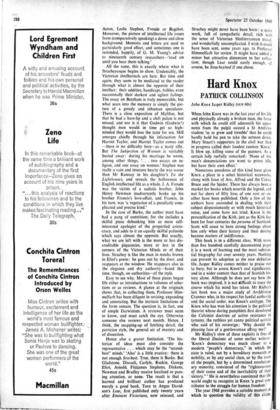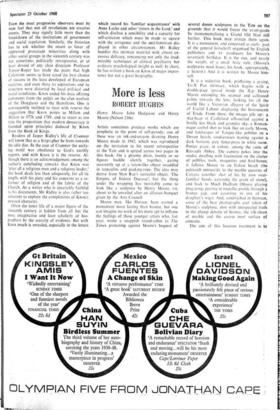Hard Knox
PATRICK COLLINSON
John Knox Jasper Ridley (oup 60s) When John Knox was in the last year of his life and physically already a broken man, the force with which he could still admonish his oppo- nents from the pulpit caused a St Andrews student `sa to grew and tremble' that he could hardly hold his pen to take the sermon down.
Mary Stuart's supporters in the civil war then in progress called their loudest cannon 'Knox.'
It blew up, killing some of the gunners. As a certain lady ruefully remarked: 'None of this man's denunciations are wont to prove idle, but have their own effect.'
Numerous anecdotes of this kind have given Knox a place in a select historical waxworks, along with Joan of Arc, Alfred and the Cakes, Bruce and the Spider. There has always been a market for books which nourish the legend, and not far short of fifty lives of one sort or an- other have been published. Only a few of the authors have succeeded in dealing with their subject dispassionately or with much historical sense, and some have not tried. Knox is the personification of the Kirk, just as the Kirk has been for four centuries the persona of Scotland. Scots will cease to have strong feelings about him only when their history and their destiny become matters of indifference.
This book is in a different class. With more than five hundred carefully documented pages it is a work of learning and the most substan- tial biography for over seventy years. Nothing can prevent its adoption as the new definitive life. Jasper Ridley comes neither to praise nor to bury, but to assess Knox's real significance, and in a wider context than that of Scottish his- tory alone. Although he does not say how the book was inspired, it is not difficult to trace the course which his mind has taken. Mr Ridley's last book was a major study of Archbishop Cranmer who, in his respect for lawful authority and the social order, was Knox's antitype. The Knox who has won his attention is the political theorist whose daring pamphlets first developed the Calvinist doctrine of active resistance to tyranny, the ruthless yet canny political activist who said of his sovereign: 'Why should the pleasing face of a gentlewoman affray me?' Mr Ridley's view of these exploits is free of the liberal illusions of some earlier writers:
'Knox's democracy was much closer to a modern "people's democracy," in which the
state is ruled, not by a hereditary monarch or
nobility, or by any social class, or by the mass of the people, but by a determined revolution-
ary minority, convinced of the "righteousness of their cause and of the inevitability of their victory."' He is nevertheless convinced that the world ought to recognise in Knox 'a great con- tributor to the struggle for human freedom.' The year 1968 provides a suitable moment at which to question the validity of this claim.
Even the most progressive observers must by now feel that not all revolutions are creative events. They may signify little more than the breakdown of the institutions of government and social regulation. Similarly, the historian has to ask whether the resort to force of oppressed protestant minorities along with other social groups in the sixteenth century was not sometimes politically retrogressive, or at least devoid of any clear direction. Professor Trevor-Roper has made the point that high Calvinism seems to have stood the best chance of success in the least developed of European societies, and even there its aspirations and its structure were distorted by local political and social conditions. Knox ended his days offering comments from the pulpit on the clan warfare of the Douglases and the Hamiltons. One is consequently inclined to treat with reserve the suggestion that Knox points to Milton and Milton to 1776 and 1789, and to reject as too trite the proposition that modern democracy is founded upon principles deduced by Knox from the Book of Kings."
Readers of Jasper Ridley's life of Cranmer will know that as a biographer he leans towards the id& fixe. In the case of Cranmer the unify- ing motif was obedience to God's earthly regents, and with Knox it is the reverse. Al- though there is an acknowledgement among the author's concluding remarks that Knox was 'after all a religious man and a religious leader,' this book deals less than adequately, for all its length, with his piety and his concerns as a re- former of religion and of the fabric of the Church. As a writer who is invariably faithful to his documents, Mr Ridley is also rather too reluctant to explore the complexities of Knox's unusual character.
Often the inner life of a major figure of the sixteenth century is hidden from all but the most imaginative and least scholarly of bio- graphers by the scarcity of evidence. But with Knox much is revealed, especially in the letters which record his 'familiar acquaintance' with Anne Locke and other 'sisters in the Lord,' and which disclose a sensibility and a capacity for self-criticism which must be made to square with the arrogance and the- anti-feminism dis- played in other circumstances. Mr Ridley handles this intimate material with almost ex- cessive delicacy, renouncing not only the inad- missible techniques of clinical psychiatry but ordinary psychological insight as well. In short, he has written a book on Knox of major impor- tance but not a great biography.















































 Previous page
Previous page